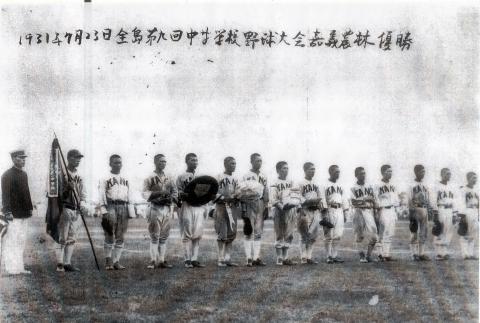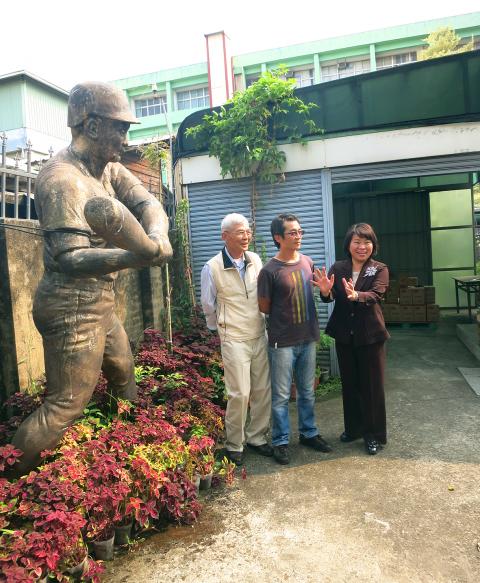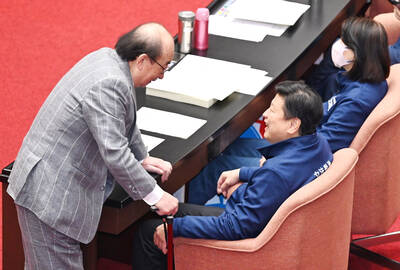When Wei Te-sheng (魏德聖), the director of Cape No. 7 and Seediq Bale, heard of a Chiayi high school baseball team that “almost” won the all-Japan Koshien summer tournament in Kobe in 1931, he just knew he had to make a movie about it. So he wrote a script, signed on as producer, asked Umin Boya to direct it, raised a pile of money, hired a cast of Taiwanese actors and extras, and the film, currently in production in Chiayi and other cities, is set to be released in early 2014.
The movie’s working title is “Kano,” the nickname of the old Chiayi Agricultural and Forestry Vocational High School, which no longer exists. The nickname comes from the first two English letters of the two Japanese words “Ka-gi No-rin,” with ‘Kagi’’ being the Japanese word for Chiayi and ‘’No-rin’’ being the Japanese term for agriculture and forestry.
“From time to time, Japanese tourists will stop here,” says Yu Guei-in (余佳蓁), a senior at National Chiayi University (NCYU), who works part-time as a secretary at the museum.

Photo: AFP
“Last summer, a Japanese reporter from the Sankei Shimbun newspaper came here to look around and ask us some questions about the movie, and three French tourists stopped by in August while visiting the city’s temples,” Yu says.
While most people in Chiayi know about the team’s exploits in 1931, few are aware that just a few steps from the modern 15-story glass-paneled city hall there is an old one-story Japanese-era building, hidden behind a long cement wall, that serves as an informal Kano museum for the team.
The building, still sporting sweet-smelling tatami mats and sliding paper doors in the Japanese style, houses the offices of the Kano Alumni Association. Supported by the city and a local university, it has a volunteer staff and is open Monday to Friday for tourists, scholars and history buffs. It’s a quiet place now, but once the movie is released, it could get crowded.

Photo: AFP
Inside the wooden structure, built in the 1920s, there is a library with dozens of copies of the Kano Alumni Association annual magazine, still published in Chinese by National Chiayi University (MCYU), and hundreds of old black-and-white photographs of the 1931 baseball squad. Outside in the courtyard there’s even a statue of one of the original team’s players holding up a bat and seemingly still ready to play ball.
Tourism opportunity
The Chiayi city government sees an opportunity in the 2014 release of the Wei-produced movie, which is said to be a cross between a baseball drama and a love story. Yes, Wei wrote a young woman into the script, and she’ll be the love interest of one of the players. So with expectations high that the movie will attract tourists from across Taiwan and Japan in the future, the city government’s tourism department donated a nice chunk of change — NT$500,000 — to help fund the movie.
Nearby, National Chung Cheng University, just a 30-minute bus ride from Chiayi, is planning to set up a tourist attraction based on the movie, since some of the action scenes will be filmed at Chung Cheng University.
According to Angel Chen (陳廷萱), a graduate student working on her master’s degree in marketing, the movie’s connection to Chiayi and Taiwan’s history during the Japanese Colonial Period (1895-1945) offers a “perfect storm” of public relations and tourism opportunities for all those involved in the movie’s production.
Location, location, location
Location shooting for the movie is going on now, in Chiayi, Taichung, Tainan and Kaohsiung, according to film industry sources. Some sets will be built and many locals have been hired as extras to appear in various crowd scenes. Umin Boya, an Aboriginal actor in his 30s who was in the cast of Seediq Bale, is directing the movie from a script by Wei. The director, who played baseball as a teenager, told reporters earlier this year that he understands the emotions of ball players and is looking forward to the film’s release, not only in Taiwan, but in Japan and other countries in Asia.
Imperial Japan in those days had colonies in Taiwan, Korea and Manchuria, and teams from those regions were invited to Koshien if they made the grade. But only the Kano team from Taiwan was invited to the all-Japan championships, and not just once, according to Masato Fujishima, a Japanese reporter for the Asahi Shimbun in Tokyo, but five times. However, it was only the 1931 team that played their hearts out all the way to the Koshien finals.
stealing the show
According to Fujishima, the 1931 Kano team won the hearts of Japanese baseball fans, and even today, the story has not been forgotten among Japanese. So a feature movie about the team, set in the 1930s and adding a love story to the drama of the final game in Kobe on a hot summer day, should go over well in Japan, too.
The movie will tell the story of a high school baseball team comprised of three ethnic groups — Japanese, Han Chinese and Aboriginal boys — and one tough Japanese coach.
The “Chiayi Norin Gakko’’ team took a boat from Keelung to Japan in the summer of 1931 and turned a lot of heads in Kobe.
By some kind of baseball miracle, the teenage boys from Taiwan surprised the experts in Imperial Japan and came in second. Their earlier run of good luck and the final game is now part of Taiwan lore, but for most people it’s a long forgotten story. Wei hopes to put a new spin on it.
While the Kano team is now history, its “never give up” attitude will be a big part of the movie, according to Umin Boya. And with an unofficial Kano museum and outdoor shrine still standing in the middle of Chiayi today, the building’s staff is getting ready for what might just be a big tourism boom when the film is finally released.

Feb. 17 to Feb. 23 “Japanese city is bombed,” screamed the banner in bold capital letters spanning the front page of the US daily New Castle News on Feb. 24, 1938. This was big news across the globe, as Japan had not been bombarded since Western forces attacked Shimonoseki in 1864. “Numerous Japanese citizens were killed and injured today when eight Chinese planes bombed Taihoku, capital of Formosa, and other nearby cities in the first Chinese air raid anywhere in the Japanese empire,” the subhead clarified. The target was the Matsuyama Airfield (today’s Songshan Airport in Taipei), which

On Jan. 17, Beijing announced that it would allow residents of Shanghai and Fujian Province to visit Taiwan. The two sides are still working out the details. President William Lai (賴清德) has been promoting cross-strait tourism, perhaps to soften the People’s Republic of China’s (PRC) attitudes, perhaps as a sop to international and local opinion leaders. Likely the latter, since many observers understand that the twin drivers of cross-strait tourism — the belief that Chinese tourists will bring money into Taiwan, and the belief that tourism will create better relations — are both false. CHINESE TOURISM PIPE DREAM Back in July

Could Taiwan’s democracy be at risk? There is a lot of apocalyptic commentary right now suggesting that this is the case, but it is always a conspiracy by the other guys — our side is firmly on the side of protecting democracy and always has been, unlike them! The situation is nowhere near that bleak — yet. The concern is that the power struggle between the opposition Chinese Nationalist Party (KMT) and their now effectively pan-blue allies the Taiwan People’s Party (TPP) and the ruling Democratic Progressive Party (DPP) intensifies to the point where democratic functions start to break down. Both

This was not supposed to be an election year. The local media is billing it as the “2025 great recall era” (2025大罷免時代) or the “2025 great recall wave” (2025大罷免潮), with many now just shortening it to “great recall.” As of this writing the number of campaigns that have submitted the requisite one percent of eligible voters signatures in legislative districts is 51 — 35 targeting Chinese Nationalist Party (KMT) caucus lawmakers and 16 targeting Democratic Progressive Party (DPP) lawmakers. The pan-green side has more as they started earlier. Many recall campaigns are billing themselves as “Winter Bluebirds” after the “Bluebird Action”